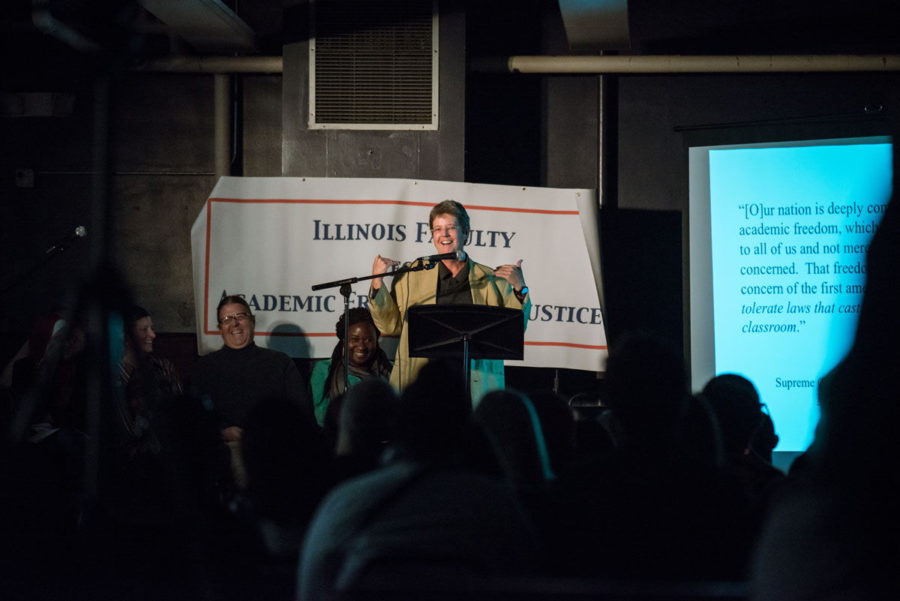Speaker reschedules discussion after cancelling with University
Columbia Law Professor Katherine Franke cancelled a speaking engagement at UI following the University’s decision against the appointment of Stephen Salaita. Franke attended a panel Thursday at an off-campus location to discuss the controversy.
September 22, 2014
In the wake of the Board of Trustees’s decision against appointing Steven Salaita to a tenured position in the American Indian Studies program at the University, approximately 100 students, faculty and Urbana-Champaign community members attended a discussion led by Columbia Law Professor Katherine Franke. She was joined by a panel of University graduate students and professors to discuss academic freedom and political dissent surrounding the Salaita controversy.
Less than one month ago, Franke sent a letter to Chancellor Phyllis Wise cancelling her prior speaking arrangements at the University. Franke relocated the discussion to an off-campus location, the Urbana-Champaign Independent Media Center, and traveled on her own expense. Franke said it was important to hold the discussion because she said she wanted to “stand with you (audience members) in outrage.”
“For me to come after what had happened in the last month and, in a sense, validate an academic and intellectual community by giving speeches or lectures here seemed corrupt to me,” Franke said.
Franke criticized Wise’s description of Salaita’s tweets, which Wise described as being uncivil.
“Whatever else civility may be, it is not an academic norm,” Franke said.
Get The Daily Illini in your inbox!
Franke went on to discuss the constitutionality of the controversy and she said she believes Salaita would have an “easy case” if he followed through with a lawsuit against the University.
“The constitutional protection of speech rights protects all speeches, even speech we might find odious or offensive,” Franke said. “The uncivil university is something to applaud, not condemn.”
Each panel member discussed his or her viewpoints on the Salaita issue and how it has affected them, including Eman Ghanayam, graduate student in LAS.
“He’s a Palestinian living in diaspora, still has relatives who are subjected to persecution in Palestine and his tweets commented on one of the most atrocious crimes of 2014, if not the 21st century, that resulted in the killing of almost 2,900 people,” Ghanayam said.
During the presentation, Franke said President Robert Easter, the Board of Trustees and Wise’s decision to not reinstate Salaita will lead to longer term implications.
She said this decision will lead to making “people now wonder whether it’s a school to which they should apply as a student or as a faculty member.”
Franke said that the problem with attempting to censure the University’s scholarship is that it does not give University students enough credit.
“They can take it; they need to develop the critical skills to engage in arguments they disagree with or find offensive,” Franke said.
During her lecture, Franke questioned how relevant faculty members’s extracurricular speech is in relation to their ability to perform and function well in the classroom.
Erik S. McDuffie, professor of African-American Studies and member of the Illinois Faculty for Freedom and Justice, said this case has “profoundly impacted segments of faculty and administration” and added that some departments have gone so far as to suspend job searches.
McDuffie said the whole issue surrounding the Salaita case is “catastrophic” and reiterated that more than 16 departments have issued votes of no confidence in the chancellor.
Erica Melko, graduate student in LAS, attended the event and said that academic freedom is vital to the University in order to “function and serve as active and vibrant.”
Franke said it is important for students to demand a stimulating, diverse and intellectually cutting-edge faculty.
“Students have to make noise,” Franke said.
Anike can be reached at [email protected].







